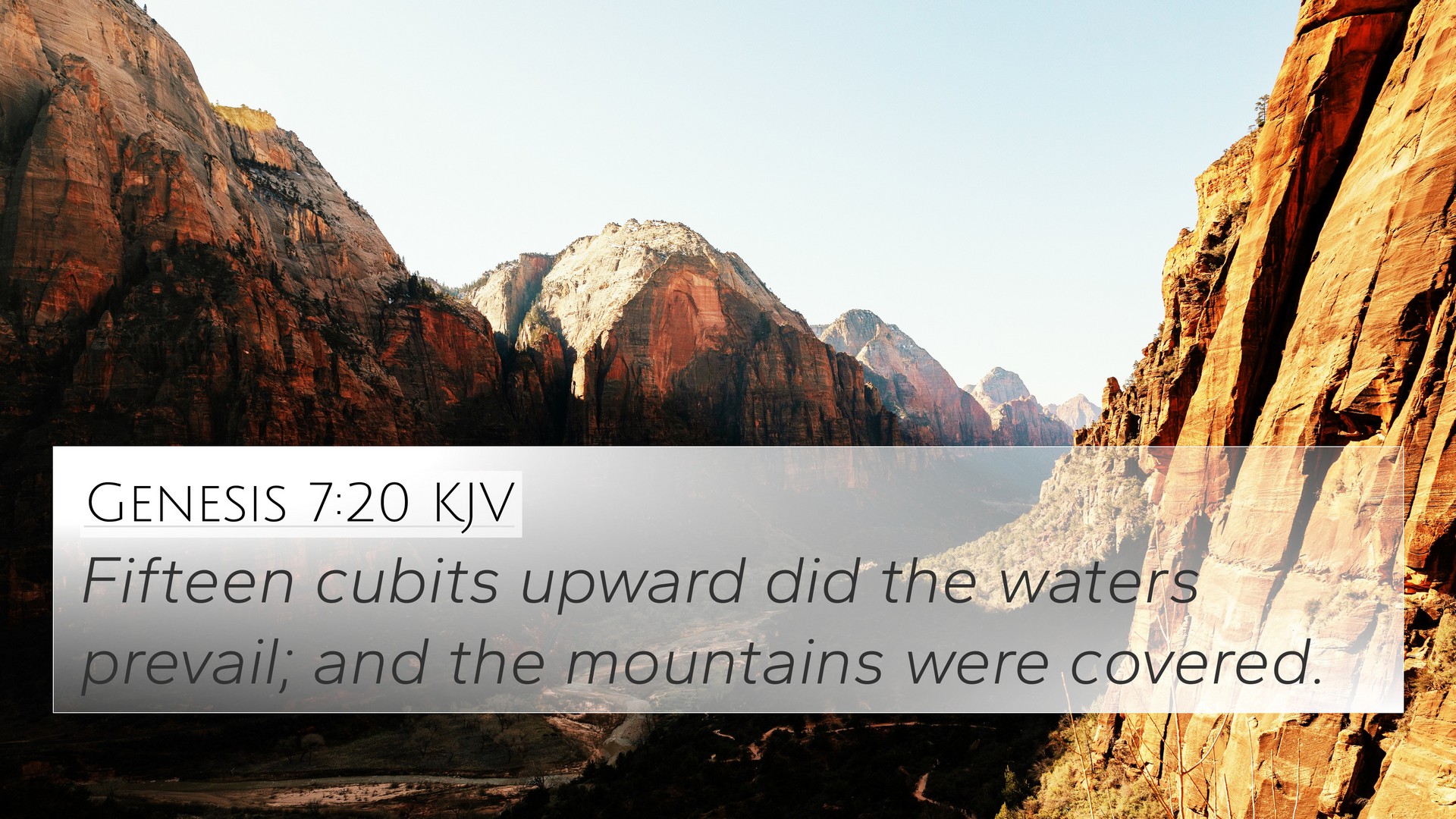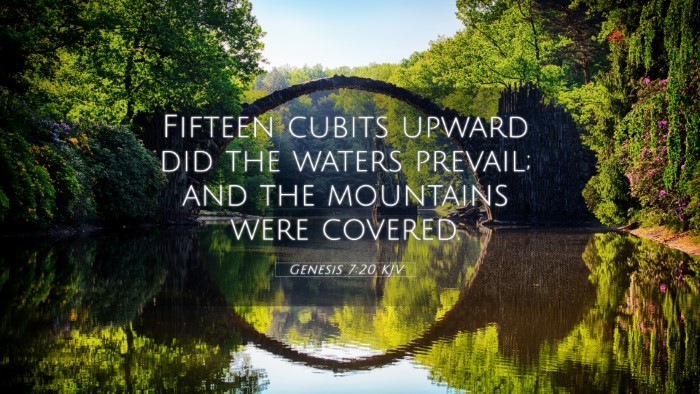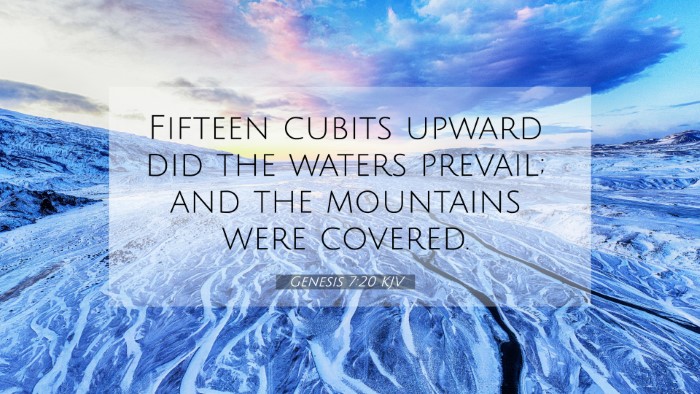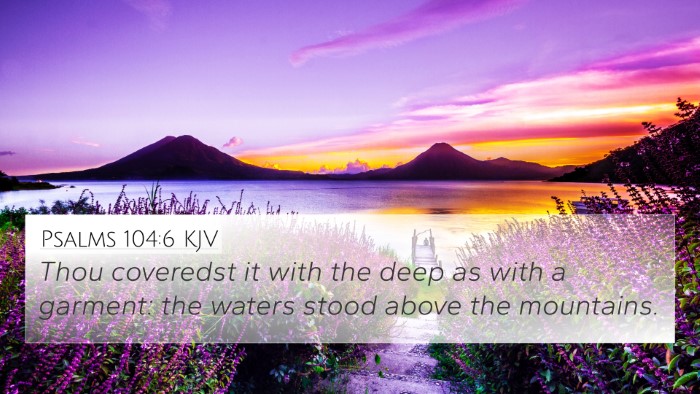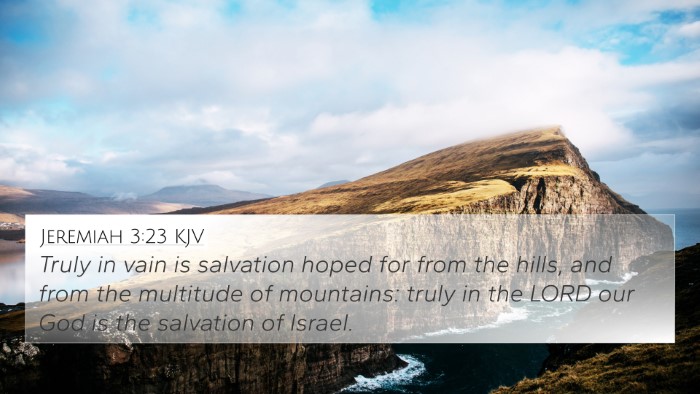Understanding Genesis 7:20
Genesis 7:20 reads: "Fifteen cubits upwards did the waters prevail; and the mountains were covered." This verse occurs in the context of the great flood, marking a pivotal moment in Biblical history. Below, we will explore its meaning through insights from public domain commentaries by Matthew Henry, Albert Barnes, and Adam Clarke.
Summary of Insights from Commentaries
Matthew Henry's Commentary:
Matthew Henry emphasizes the depth and omnipotence of God's judgment during the flood. The phrase "fifteen cubits" indicates the magnitude of the floodwaters, suggesting that it was not merely a local inundation but a global catastrophe affecting all living things. Henry notes the importance of understanding the flood as a demonstration of God's wrath against unrepentant sin and highlights that the covering of the mountains signifies the totality of the destruction.
Albert Barnes' Notes:
Albert Barnes provides a detailed examination of "fifteen cubits." He explains that a cubit is generally considered to be about 18 inches, which translates to approximately 22.5 feet. This measurement emphasizes the vastness of the flood. Barnes also points out that the waters prevailed, suggesting an overwhelming force that showcases God's power and control over Creation. The covering of the mountains further illustrates that no refuge was available for the sinful populace during this divine judgment.
Adam Clarke's Commentary:
Adam Clarke presents a historical perspective, interpreting the flood as a significant turning point for humanity. He views the rising waters as symbolic of God’s sovereignty and offers insight into why God chose to cleanse the earth in this manner. Clarke also mentions that the flood illustrates God's mercy alongside His judgment, as Noah and his family were saved to continue humanity through a new covenant with God.
Key Theological Themes
Genesis 7:20 raises several critical theological themes including:
- The Justice of God: The flood serves as a warning of God's judgment against sin.
- The Mercy of God: Noah's salvation represents God's grace amid judgment.
- The Sovereignty of God: Demonstrates God's ultimate control over the natural world.
- Creation's Response to God: The flood reflects creation's obedience to the Creator's command.
Bible Verse Cross-References
To fully grasp the implications of Genesis 7:20, we can cross-reference other scripture passages that relate to this theme:
- Genesis 6:17: "And behold, I, even I, do bring a flood of waters upon the earth." This directly forecasts the flood event.
- Genesis 7:19: "And the waters prevailed exceedingly upon the earth." This emphasizes the monumental nature of the flood.
- Exodus 15:5: "The depths have covered them." This verse reflects similar imagery of overwhelming waters as judgment.
- Psalm 29:10: "The Lord sat upon the flood." This highlights God's authority even over chaotic waters.
- Matthew 24:38-39: "For as in the days before the flood, they were eating and drinking..." Jesus references the flood to illustrate His return.
- 2 Peter 3:6: "Whereby the world that then was, being overflowed with water, perished." This connects the flood to the final judgment theme.
- Hebrews 11:7: "By faith Noah, being warned of God of things not seen as yet..." This verse emphasizes Noah's belief amidst the impending judgment.
- Genesis 8:4: "And the ark rested in the seventh month, on the seventeenth day of the month, upon the mountains of Ararat." This demonstrates God's providence following the judgment.
Inter-Biblical Dialogue and Thematic Connections
The study of Genesis 7:20 and the surrounding verses opens the door for a rich dialogue on several theological themes. Understanding these connections requires tools for Bible cross-referencing that can help identify similar narratives and lessons drawn from various scriptural accounts.
Tools for Bible Cross-Referencing
Utilizing a Bible concordance or a cross-reference Bible study guide is essential for exploring connections between this verse and others. By understanding how to navigate these resources, you can uncover deeper insights into the themes and meanings of Biblical texts.
Conclusion
Genesis 7:20 serves as a profound reminder of God's power and judgment while simultaneously reflecting His mercy. Through careful analysis and cross-referencing with other scriptures, one can gain a clearer understanding of the biblical narrative surrounding the flood. This verse not only connects with key Old Testament themes but also has implications for New Testament teachings, showcasing the importance of inter-Biblical dialogue.
As we explore these connections, let us strive to grow in knowledge and understanding of Scripture, realizing that every verse contributes to the divine tapestry of God's covenant with humanity.
